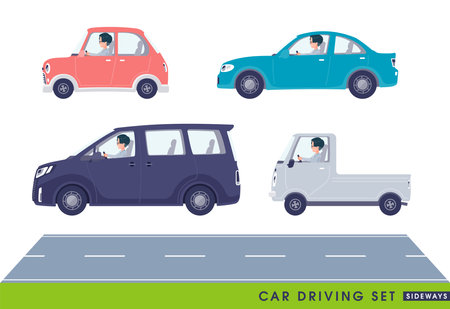1. Introduction: The Importance of Saloon Car Safety in the UK
For British families, selecting a new saloon car is about far more than sleek lines or boot space—safety consistently tops the list of priorities. With UK roads seeing over 1,500 fatalities and more than 25,000 serious injuries annually, according to Department for Transport figures, it’s no wonder that safety credentials drive purchasing decisions. Recent trends reveal that parents and commuters alike are increasingly turning to the latest Euro NCAP ratings and advanced driver-assistance systems (ADAS) before signing on the dotted line. In fact, a 2023 survey from the RAC found that 68% of UK families would rule out any saloon lacking top-tier crash test results or cutting-edge safety features.
| Year | Serious Road Injuries (UK) | Saloon Cars with Euro NCAP 5-Star Rating (%) |
|---|---|---|
| 2018 | 27,295 | 53% |
| 2020 | 23,529 | 61% |
| 2023 | 22,530 | 74% |
This surge in demand for safer saloons is also fuelled by advances in automotive technology and stricter government regulations. Today’s buyers expect comprehensive protection—from autonomous emergency braking to lane-keeping assist—and manufacturers are responding with an ever-expanding array of innovations. As we compare the safety features available in today’s most popular saloon models, it becomes clear that peace of mind is now an essential part of the family motoring experience in Britain.
Crash Test Standards and How UK Saloons Perform
When it comes to family safety, British car buyers rightly demand rigorous standards. The Euro NCAP (European New Car Assessment Programme) plays a pivotal role in shaping consumer confidence by providing transparent and objective crash test results. For saloons—still a popular choice among UK families—the latest Euro NCAP procedures focus on four main pillars: Adult Occupant Protection, Child Occupant Protection, Vulnerable Road User Protection (pedestrians and cyclists), and Safety Assist technologies.
An Overview of Euro NCAP Testing Procedures
Euro NCAP’s testing is comprehensive and continually updated to reflect real-world scenarios. Assessments include frontal offset crashes, side impacts, pole tests, and whiplash protection, alongside evaluations of automatic emergency braking (AEB), lane keeping aids, and driver fatigue alerts. Each category is scored individually, then combined for an overall star rating (from one to five stars).
How Popular Saloons Stack Up
The table below summarises the most recent Euro NCAP ratings for some of the best-selling saloon models in the UK market:
| Model | Overall Star Rating | Adult Occupant | Child Occupant | Safety Assist |
|---|---|---|---|---|
| Toyota Camry | 5 Stars | 93% | 87% | 85% |
| BMW 3 Series | 5 Stars | 97% | 87% | 76% |
| Mercedes-Benz C-Class | 5 Stars | 93% | 89% | 82% |
| Tesla Model 3 | 5 Stars | 96% | 86% | 94% |
What These Results Mean for British Families
The data demonstrates that leading saloon models consistently achieve high scores across all safety categories, reflecting manufacturers’ commitment to both passive and active safety features. Models like the BMW 3 Series and Tesla Model 3 excel not only in occupant protection but also in advanced driver assistance systems—a crucial consideration for families navigating busy British roads. Ultimately, while all top saloons tested offer robust protection, subtle differences in child occupant safety or technology integration may influence the best fit for your family’s unique needs.

3. Key Active Safety Technologies Available
In today’s saloon market, advanced driver assistance systems (ADAS) have become a defining benchmark for safety—especially for British families looking to combine practicality with peace of mind. Modern saloons are increasingly equipped with active safety technologies designed to prevent accidents before they occur, rather than simply mitigating the impact. Among the most prominent features are lane-keeping assist (LKA), autonomous emergency braking (AEB), and adaptive cruise control (ACC). These systems use a network of sensors, cameras, and radar to monitor road conditions, detect hazards, and intervene when necessary.
ADAS Feature Implementation in Leading Saloons
The table below offers a comparative look at how key ADAS technologies are implemented across popular saloon models available in the UK:
| Model | Lane-Keeping Assist | Autonomous Emergency Braking | Adaptive Cruise Control |
|---|---|---|---|
| Ford Mondeo | Standard on all trims | Standard; Pedestrian & Cyclist Detection | Optional on mid/high trims |
| BMW 3 Series | Standard on Sport/above | Standard; City & Motorway Mode | Standard on M Sport Pro Edition |
| Toyota Camry | Standard across range | Standard; Junction Assist Included | Standard on all trims |
| Vauxhall Insignia | Optional package only | Standard; Night-time Functionality | Optional on SRi and above |
Main Features Explained for British Drivers
Lane-Keeping Assist (LKA)
LKA actively monitors lane markings using cameras and gently corrects steering if the car begins to drift unintentionally—a crucial aid for UK’s winding country roads and busy motorways.
Autonomous Emergency Braking (AEB)
AEB detects imminent collisions with vehicles, pedestrians, or cyclists and applies the brakes automatically if the driver fails to react in time. This feature has proven particularly effective in reducing rear-end shunts, which are common on congested British roads.
Adaptive Cruise Control (ACC)
This system maintains a set speed while automatically adjusting to keep a safe distance from the vehicle ahead—especially useful during those long stretches on the M1 or A-roads where traffic flow can be unpredictable.
The Verdict: Are These Features Standard?
While many mainstream saloons now offer these features as standard or affordable options, there is still variation depending on trim level and manufacturer. For British families prioritising safety, it is essential to scrutinise equipment lists carefully—not all entry-level models are created equal when it comes to ADAS provision.
4. Passive Safety Features: More Than Just Airbags
When considering the safety of modern saloons for British families, passive safety features remain a critical area of focus. While airbags have become almost synonymous with crash protection, the reality is that today’s saloons integrate a comprehensive suite of passive technologies designed to safeguard occupants in the event of a collision.
Structural Innovations: The Unsung Heroes
Leading manufacturers have invested heavily in advanced body structures. High-strength steel, crumple zones, and reinforced passenger cells are now standard across many mainstream models. These elements work together to absorb and dissipate crash energy, minimising cabin deformation and reducing injury risk. For example, the latest Ford Mondeo and Volkswagen Passat both utilise multi-phase steel in critical areas to enhance rigidity without adding unnecessary weight.
Restraint Systems: Beyond the Seatbelt
Whilst seatbelts remain fundamental, their effectiveness is now amplified by sophisticated restraint systems such as pre-tensioners and load limiters. These mechanisms tighten belts instantly at the moment of impact, then gradually release tension to prevent chest injuries. Additionally, Isofix child seat anchorages are a legal requirement in all new cars sold in the UK, offering a secure and straightforward method for installing child restraints – a key consideration for family buyers.
Comparing Key Passive Safety Elements in Popular British Saloons
| Saloons | High-Strength Steel Structure | Crumple Zones | Advanced Airbag Array | Isofix Points |
|---|---|---|---|---|
| Ford Mondeo | ✔️ | Front & Rear | Front, Side, Curtain | Rear Outer Seats |
| Vauxhall Insignia | ✔️ | Front & Rear | Front, Side, Curtain | Rear Outer Seats |
| Toyota Camry (UK spec) | ✔️ | Front & Rear | Front, Side, Curtain, Knee | Rear Outer Seats |
| Volkswagen Passat | ✔️ (Multi-phase) | Front & Rear | Front, Side, Curtain, Knee (driver) | Rear Outer Seats |
The Role of Additional Passive Features
Modern saloons also incorporate whiplash-reducing head restraints and energy-absorbing steering columns. Some models even offer side-impact door beams and underbody protection against intrusion during severe collisions. Together, these features form an integrated shield that operates silently but effectively to protect British families on every journey.
This holistic approach to passive safety ensures that today’s saloons do far more than simply tick regulatory boxes—they actively contribute to peace of mind for parents and passengers alike.
5. Child Occupant and Family-Friendly Safety Considerations
When assessing the safety of modern saloons for British families, it’s imperative to scrutinise how well these vehicles cater to children’s needs and family-friendly requirements. Key features such as child seat anchorage options (ISOFIX compatibility), rear door child locks, and integrated booster seats can make a significant difference in daily usability and peace of mind for parents. Below is a comparative overview of these crucial features as found in popular saloon models on UK roads.
Child Seat Anchorage: ISOFIX and Beyond
The ISOFIX system has become standard in most new saloons, offering a secure and straightforward method for installing child seats. However, variations exist in terms of the number of ISOFIX points provided and their accessibility, which can affect practicality for families with multiple young children.
| Saloon Model | Number of ISOFIX Points | Ease of Access | Additional Tether Anchorages |
|---|---|---|---|
| Ford Mondeo | 2 (Rear Outboard Seats) | Easy | Yes |
| BMW 3 Series | 2 (Rear Outboard Seats) | Moderate (Deep Seat Base) | Yes |
| Toyota Camry | 2 (Rear Outboard Seats) | Easy | No |
| Skoda Superb | 3 (Including Front Passenger) | Very Easy | Yes |
Rear Door Child Locks: Security at Your Fingertips
The presence and type of rear door child locks—manual or electronic—can be a deciding factor for many British families. Electronic child locks offer greater convenience from the driver’s seat, while traditional manual locks are still reliable but less flexible.
| Saloon Model | Type of Child Lock | User-Friendliness | Status Indicator Available? |
|---|---|---|---|
| Tesla Model 3 | Electronic | High (Driver-Controlled) | Yes (Dashboard Alert) |
| Audi A4 | Manual Lever | Moderate (On Each Door) | No |
| Kia Optima | Electronic & Manual Combo | High (Selectable) | No |
| Volkswagen Passat | Manual Lever | Basic (Traditional Design) | No |
Built-in Booster Seats: Added Convenience for Growing Families
A select few saloons now offer built-in booster seats, catering directly to the needs of British families with older children who have outgrown traditional car seats but still require elevation for safe belt positioning. This feature is particularly valued for its space-saving design and ease of use during school runs or family outings.
Saloons Offering Built-in Boosters:
- Volvo S90: Integrated into rear seats; pop-up design; suitable for children aged 4–10 years.
- Skoda Superb: Optional integrated booster; convenient folding mechanism.
The Takeaway for British Families:
While all modern saloons meet basic safety regulations, the above comparison shows that some models go further in addressing family-specific needs. When choosing a new saloon, British parents should consider not only crash test ratings but also everyday usability features like ISOFIX point accessibility, advanced child locking systems, and integrated boosters that enhance both safety and convenience during busy family life.
6. Saloon Safety vs. Other Popular Family Car Types
When evaluating the safety of today’s saloons, it is essential to consider how they stack up against other popular family car types—namely estates, SUVs, and hatchbacks—within the UK market. British families have diverse preferences, often influenced by factors such as practicality, comfort, running costs, and, increasingly, advanced safety provisions.
Comparative Safety: Saloons vs. Estates
Estates are traditionally chosen for their spaciousness and versatility. However, when it comes to crash safety and occupant protection, modern saloons generally match or even exceed estates in Euro NCAP ratings. Both categories now benefit from similar driver assistance technologies and structural engineering advances.
Saloon vs. SUV: Heightened Debate
SUVs have surged in popularity across Britain, largely due to their elevated driving position and perception of greater safety. While SUVs may perform better in certain impact scenarios (such as side collisions), their higher centre of gravity can compromise stability and increase rollover risk compared to the lower-profile saloon.
Hatchbacks: Compact Yet Capable
Hatchbacks appeal to urban families for their manoeuvrability and efficiency. Despite their smaller size, leading hatchbacks rival saloons in active and passive safety features—though rear passenger protection is sometimes less comprehensive due to shorter crumple zones.
At-a-Glance Safety Comparison
| Car Type | Euro NCAP Average Rating | Key Strengths | Potential Weaknesses |
|---|---|---|---|
| Saloon | 5 stars | Balanced handling; robust occupant protection; advanced driver aids | Boot access less flexible than estates/hatchbacks |
| Estate | 5 stars | Cargo space; similar safety tech as saloons; family-friendly layout | Slightly heavier; marginally longer braking distances in some cases |
| SUV | 4-5 stars | Commanding view; strong crash test performance; perceived ruggedness | Higher rollover risk; increased weight impacts agility and emissions |
| Hatchback | 4-5 stars | Maneuverability; city-friendly size; cost-effective ownership | Limited rear crumple zone; smaller boot capacity for families |
The British market’s appetite for family cars is shaped by both tradition and technological progress. Saloons continue to hold their own on the safety front, offering a reassuring blend of innovation and refinement that compares favourably with estates, SUVs, and hatchbacks. Ultimately, choosing between these body types should hinge not just on lifestyle needs but also on a careful appraisal of the specific safety credentials offered by each model within its class.
7. Conclusion: Which Saloons Stand Out for British Family Safety?
After a comprehensive analysis of the latest safety features and independent crash test results, it is clear that not all saloons offer the same level of protection for British families. Our comparison has considered key areas such as advanced driver assistance systems (ADAS), passive safety equipment, child occupant protection, and overall Euro NCAP ratings.
| Saloons | Euro NCAP Rating | Key Safety Features | Child Protection Score |
|---|---|---|---|
| Volvo S60 | 5 Stars | Pilot Assist, City Safety, Run-off Road Mitigation | 87% |
| Tesla Model 3 | 5 Stars | Autopilot, Emergency Lane Keeping, Collision Avoidance Assist | 86% |
| Mercedes-Benz C-Class | 5 Stars | PRE-SAFE System, Active Brake Assist, Attention Assist | 90% |
| Toyota Camry | 5 Stars | Toyota Safety Sense, Adaptive Cruise Control, Lane Departure Alert | 86% |
| BMW 3 Series | 5 Stars | Active Guard Plus, Dynamic Stability Control, Pedestrian Detection | 87% |
Expert Recommendations for UK Families
- Best Overall Safety: The Mercedes-Benz C-Class edges ahead with its outstanding child occupant score and comprehensive suite of active and passive safety technologies. For families prioritising top-tier protection and peace of mind on British roads, this model stands out as a leader.
- Best for Technology-Driven Safety: Both the Volvo S60 and Tesla Model 3 excel in integrating cutting-edge ADAS, making them ideal for tech-savvy families who value proactive crash prevention and smart features.
- Reliability with Affordability: The Toyota Camry combines robust safety credentials with renowned reliability, appealing to practical British families seeking value without compromising on protection.
The Final Word for British Families
No matter your priorities—be it maximum child protection, innovative technology or strong value—the current crop of family saloons in the UK market offers impressive standards of safety. Our advice is to prioritise models with high Euro NCAP scores and advanced driver assistance features. Always check the latest test results and ensure your chosen saloon meets your familys specific needs. By doing so, you can drive with confidence knowing that your loved ones are well protected on Britains diverse roadways.


